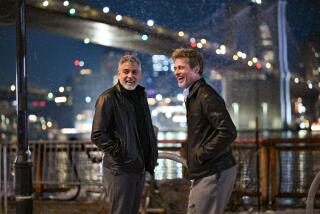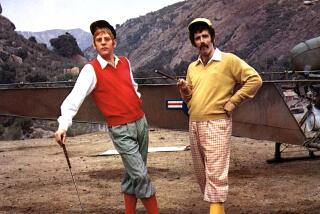How ‘Cooley High’ changed the landscape for black films in 1975
Robert Townsend, the acclaimed director of such films as 1987’s “Hollywood Shuffle” and 1991’s “The Five Heartbeats,” got his start in the biz as a teenager with a one-line role in the 1975 African American teen dramedy “Cooley High.”
“The movie changed my life,” recalled Townsend in a recent interview. “I remember after I made the movie and it finally premiered in the theater in downtown Chicago, I started to cry. It was like this is my life. This is where I grew up, this is real.
“It’s a movie, but it’s making me laugh, it’s making me think, and to me that’s what real movies do — speak to people that look like me and speak to everybody. That was my first lesson from [director] Michael Schultz. “
And now, 44 years after Townsend wept in that darkened Chicago theater, he’s hosting a screening of “Cooley High” and a salute to Schultz on Monday evening at the Academy of Motion Picture Arts and Sciences’ Samuel Goldwyn Theater.
Set in 1964 and featuring a phenomenal Motown soundtrack, “Cooley High” stars Glynn Turman as Preach, a high school senior living in the projects in Chicago with dreams of becoming a writer. His best friend, Cochise (Lawrence Hilton-Jacobs), is a star basketball player at Edwin G. Cooley Vocational High School and is hoping to get a college scholarship. Tragedy, though, is just around the corner when the two have a run-in with the police.
The film was based on screenwriter Eric Monte’s life in Chicago.
Beside Townsend, participants in a post-screening panel discussion include Schultz, Hilton-Jacobs, Jackie Taylor, who played Cochise’s girlfriend, Garrett Morris and Emmy Award-winning writer/producer Larry Karaszewski (“Ed Wood,” “The People v. O.J. Simpson”).
“Cooley High” was released during the blaxploitation film era; movies were often violent and portrayed African American life in stereotypical terms. “Michael Schultz really changed the landscape of cinema for people of color,” noted Townsend. “He was the first one to paint with that brush of truly being human. We had never seen a movie where there was a young black man talking about that he wanted to be a writer.”
Karaszewski noted he identified more with “Cooley High” than “American Graffiti,” George Lucas’ 1973 classic to which it’s often compared.
“It just really hit me in a big way,” he said. “I grew up 90 minutes outside of Chicago. I recognized who these two guys were. I was being raised by a single mother who worked. I wanted to be a writer. It was very personal to me.”
He also believes it’s one of the great movies about friendship. “Preach and Cochise feel like real characters. They feel like real friends, who have real problems. So I totally buy these two people. They are both extraordinary. Lawrence Hilton-Jacobs is amazing. And Glynn Turman — to me it’s one of the greatest performances of all time.”
Schultz was an acclaimed theater director before he began working in film and television, earning a Tony nomination for 1969’s “Does a Tiger Wear a Necktie?,” which earned Al Pacino his first Tony.
The editor of a small film he was directing, “Together for Days,” recommended him to Steve Krantz, the producer of “Cooley High.”
“We talked on the phone,” said Schultz. “He sent me the script and I read it. It didn’t have a beginning, middle and end. So I told Steve, ‘I’m coming to California because I have a job doing television for Universal. If I can meet the writer, I’ll sit and talk to him.’ ”
When he met with Monte, he realized that though he was a wonderful storyteller, “he didn’t know how to write a film.”
So he made a deal with Krantz. He would work with Monte for a month to get the script into shape. “That’s the way it worked out.”
Schultz had worked with Turman in the New York theater. And Hilton-Jacobs, who would begin “Welcome Back, Kotter” in the fall of 1975, was also a New York actor when he was cast as Cochise.
“I had done ‘Claudine,’ ” recalled Hilton-Jacobs. “I never literally auditioned for [Schultz and Krantz]. They kind of talked to me. When I was leaving, Michael walked me down the block in Times Square and we got to the corner and right behind us was the big theater showing ‘Claudine.’ He said, ‘Do you want to do this movie?’ ”
Taylor, who has been a powerful voice in Chicago theater since creating the Black Ensemble Theater in 1976, was a young working actress when she auditioned for “Cooley High.”
“It was magical,” said Taylor, who was raised in the Cabrini-Green projects, where the film was shot.
“Glynn and Lawrence and the other actors, we formed a great bond. We felt like we were really these teenagers even though none of us were teenagers,” noted Taylor. “There was no Hollywoodness about it.”
We felt like we were really these teenagers even though none of us were teenagers. There was no Hollywoodness about it.
— Jackie Taylor
Schultz, she said, knows how to “pull the best out of people. He also knows your inner feelings and feel when you’re uncomfortable. He can feel when he might be going a little too far in the scene and he’ll pull back. I worked with a lot of directors, and I can honestly say the two most outstanding I worked with are Sidney Poitier and Michael Schultz.”
Taylor admits she was naïve after the film was released. “I thought there was a new wave of African American films that would have a strong positive message,” she said. “Of course, that wasn’t the case for the most part. I think it had a great impact in terms of allowing African Americans to see our films in a very positive way in terms of how they handled the violence. They showed us just being who we were.”
Hilton-Jacobs said the character of Cochise and the film itself were an extension of how he grew up in New York.
“I wasn’t that far removed from it at the time; I was just 21,” he said. “The group of guys I grew up with were never a gang, but we were a unit. We loved each other and protected each other. Just because you come from the hood doesn’t mean that you’re not good. Everybody has aspiration to do many things.”
After “Cooley High,” Schultz went on to direct the 1976 hit “Car Wash” and the 1985 cult fave “The Last Dragon” plus countless other films and episodic TV. And at 80, he’s still going strong.
“He’s had a phenomenal career,” said Karaszewski. “If you read movie history books, a lot of times it talks about the blaxploitation era and then it somehow magically jumps to Spike Lee. It’s like there’s a missing 15 years. The bridge there is Michael Schultz, who was a director who continued to work and continued to make interesting movies. And he quietly kept doing it. “
--------------------
Academy tribute to ‘Cooley High’
Where: Samuel Goldwyn Theater, 8949 Wilshire Blvd.
When: 7:30 p.m. Monday
Admission: Sold out, but there will be a stand-by line.
More to Read
Only good movies
Get the Indie Focus newsletter, Mark Olsen's weekly guide to the world of cinema.
You may occasionally receive promotional content from the Los Angeles Times.











